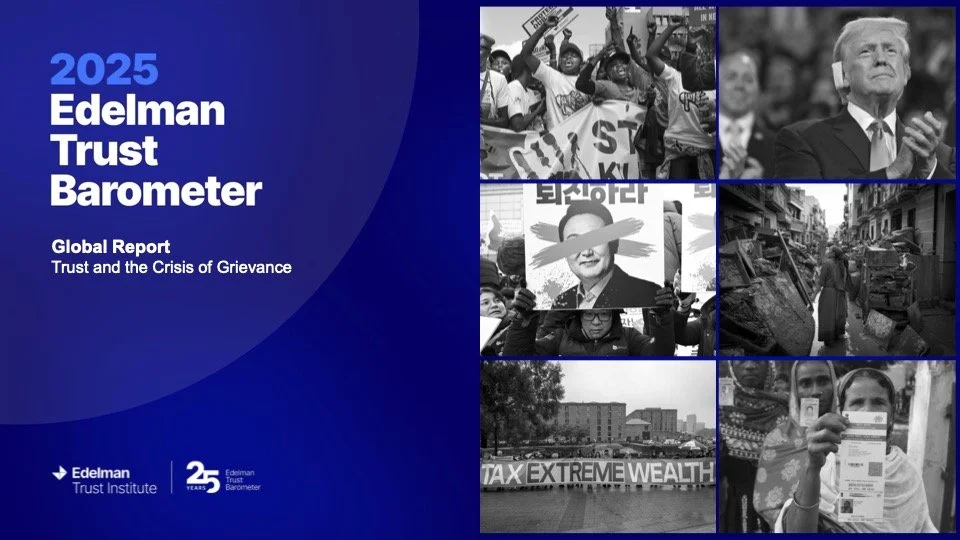Rebuilding Trust in a Fractured World Through Lessons from the 2025 Edelman Trust Barometer
The 2025 Edelman Trust Barometer offers valuable insights into global trust dynamics, revealing critical trends in how institutions are perceived across 28 countries. The Edelman Trust Barometer was first introduced in 2000 by Edelman, a global communications and marketing consultancy, as a response to the growing concern about the erosion of trust in institutions worldwide. What began as a project to measure public trust in the United States has since evolved into a comprehensive, annual global survey that assesses trust in four key institutions: business, government, media, and NGOs. This year's findings show how trust continues to evolve in the face of societal challenges, with significant shifts in key sectors like business, government, media, and NGOs.
Trust in Business Remains Stronger than Other Institutions
Despite global distrust in government and media, businesses maintain a higher level of trust compared to other institutions. According to the report, "Business is trusted in 15 out of the 28 countries measured," holding a 62% trust index globally, the highest among the four institutions. Edelman highlights that this trust is crucial in a time when, "institutions that fail to earn trust fuel grievance and create societal instability." This positions businesses as essential actors in rebuilding trust and addressing broader societal issuesg Fear of Misinformation and Distrust in News Sources** The report underscores a troubling trend of increasing skepticism about the credibility of news. Globally, 63% of respondents now find it harder to distinguish between trustworthy media and potentially deceptive sources. The survey highlights, "It is becoming harder to tell if news is from respected media or an individual trying to deceive people," signaling a growing crisis of credibility in news outlets across the world . This is a pressge for brands and media organizations that must navigate an environment of skepticism while rebuilding trust in information.
Generational Divide in Optimism for the Future
A striking finding in the 2025 Trust Barometer is the stark contrast in how younger and older generations perceive the future. Less than one in five people in developed nations believe the next generation will be better off than the current one. The report states, "Compared to today, the next generation will be better off — this sentiment is only shared by 36% of the global population," reflecting deep concerns about the future, particularly in developed countries . This reveals not only a espread grievance that is expected to shape future societal movements.
Evolution of the Edelman Trust Barometer
Initially, the Trust Barometer focused on understanding how the American public perceived key institutions. However, as the world became increasingly interconnected, Edelman expanded the survey's scope to include more than 28 markets worldwide, offering a global perspective on trust. Over the years, the survey has become one of the most significant tools for understanding global public sentiment and its implications on business, government, and society.
The 2008 financial crisis marked a pivotal point for the Trust Barometer. As the public's trust in government and financial institutions plunged, the survey revealed alarming trends about the credibility of banks, which became a defining moment in the Trust Barometer's history. In response to the crisis, the report noted that businesses began to be seen as more trustworthy than government and media, a shift that has persisted in the years since.
The COVID-19 pandemic further reshaped the landscape of trust. During this time, businesses were viewed as a critical source of information and stability, surpassing media and government in trustworthiness. As the pandemic triggered a global health crisis, the Trust Barometer showed that businesses and NGOs were seen as key players in addressing public concerns, providing aid, and ensuring safety.
In 2021, the Edelman Trust Barometer introduced the concept of a trust crisis fueled by rising grievance. With global issues such as political polarization, inequality, and climate change, public confidence in institutions was at an all-time low. This year’s report further explores this crisis of grievance, emphasizing the growing divide between those who trust institutions and those who feel marginalized by them.
The Trust Index
A critical feature of the Trust Barometer is the Trust Index, which measures public trust in the four key institutions. This index is built on a scale of 1 to 100, where a higher score indicates greater trust. In recent years, businesses have consistently ranked higher in trust compared to government, media, and NGOs.
2000: The first Trust Barometer revealed that NGOs were the most trusted institution, a surprising finding given the dominance of government and businesses at the time.
2008: The financial crisis triggered a trust collapse in banks, while businesses emerged as more trusted than government institutions, which had been severely impacted by the crisis.
2016: The rise of populism and the Brexit referendum showcased the increasing distrust of government institutions. This year also marked the beginning of the trust gap between the rich and the poor, a theme that continues to be prevalent in the most recent reports.
2020: The COVID-19 pandemic turned businesses into the most trusted institution globally, as they were seen as the most reliable source of information and action during the crisis.
2025: The most recent report addresses the crisis of grievance, where a majority of the global population holds grievances against business, government, and the wealthy. The trust deficit is particularly stark among the younger generation, who express concerns about the future.
The Edelman Trust Barometer has become an essential tool for businesses, governments, and NGOs to gauge public sentiment and understand the challenges posed by the declining trust in institutions. It has consistently highlighted the shifting role of business as a trusted leader in society, often stepping into roles traditionally filled by government and media. As the world continues to grapple with complex global challenges, the Edelman Trust Barometer serves as a vital tool for those seeking to rebuild trust and address the grievances shaping public opinion in the modern era.


